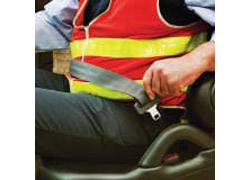 Seatbelts are required where there is roll-over danger |
Rob Vetter is technical director and managing partner with the Ives Training Group, in Blaine, WA, USA, a leader in North American mobile equipment training systems since 1981.
Recently, I helped deliver a series of training sessions on forklifts for California OSHA enforcement and consultation personnel. It was a great experience for me and, I'd like to think, for them as well. I learned a lot about how a very busy state government organisation works and they got to learn more about forklifts than they probably wanted to know!
In a tragically ironic twist of fate, four unfortunate souls in California lost their lives in forklift-related incidents the very week that the last training program was held. As I read through the details of each of the incidents, I couldn't help thinking how sad they were, especially being so close to Thanksgiving, which is a time when the focus on family togetherness is heightened, and at least four families would never be wholly together again.
However, in keeping with what seems to have become my personal MO these days, my sadness and reflection quickly gave way to raw anger because, in line with what seems to have become a characteristic of forklift fatalities these days, each of the four victims died at the hands of negligent, reckless and, in my mind, criminal employers - and I am truly sick of it.
The companies involved were two large construction outfits, a lumber yard and an employment placement agency. All have been in business since well before the federal-powered industrial truck (forklift) operator training standard came into existence nearly 18 years ago. Shameful.
The nature of the incidents - two tip-overs with no seatbelt and two "hit-by" incidents. Unacceptable.
The victims - either not trained or trained but permitted - if not encouraged - to operate unsafely and all too young to die. Tragic.
In each case, the companies involved were large, had lots of employees, made serious money and, in all likelihood, knew better - but refused to do better.
Forklift manufacturers have been putting seatbelts on their machines and telling people to use them since the mid '80s. The design and construction parts of ANSI B56.1, which is referenced by OSHA, made seatbelts a requirement in the early '90s. OSHA has enforced the use of seatbelts on forklifts under Sec 5(a) of the General Duty clause since the late '90s. What possible excuse could any large employer entity operating within the US have for not training operators to use the seatbelt and ENSURE THAT IT IS USED? None.
And what about these "hit-by" incidents, where the victims were crushed by either the forklift or the materials it was handling? While one could be excused for believing that in the chaos of an incredibly busy worksite with high volumes of pedestrian and equipment traffic in which the visibility of the operators is limited, the occasional collision of person and machine is begrudgingly inevitable, such was not the case in either of these incidents. The details of both cases indicates that the causes of each were rooted more in sloppy, unsafe work practices carried out in an environment that tolerates such practices rather than anything related to hectic activity.
We've made significant progress over the past two decades in moving the cause and effects of workplace safety forward. Perhaps the biggest single factor propelling the cause forward is the realisation by business and industry that there's 'gold in them thar hills'. Gold that can be mined in the form of increased profits gained through conscientious safety management. But there are still some that just don't or won't get it and, for those, I will borrow a variation on a phrase from within the political rhetoric that seems to have become indicative of the country's MO these days: LOCK 'EM UP!